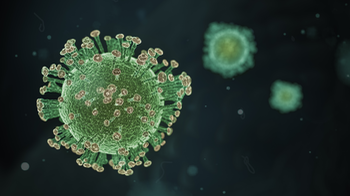The first diagnosed case of COVID-19 in Israel came on February 21 when an Israeli woman returned from a cruise that took her to Japan. On March 19, Prime Minister Benjamin Netanyahu declared a national emergency, one day before the first Israeli coronavirus death. The pandemic has become one more complication in the effort to form a new government following Israel’s third election within the past 12 months. What group of Israelis were among the very last to learn of the COVID-19 pandemic and its effect on Israel and the world?

Coronavirus by Yuri Samoilov is licensed under CC BY 2.0.
A. A group of 20 Israelis who had recently completed their service in the Israel Defense Forces left Israel in late January for a 6-week hiking and mountain climbing adventure in Huaraz, Peru. The trek covers terrain where there is no cell service, and the participants carry everything they need for the adventure, including tents, food, and other supplies. It was only upon their return to the base camp in early March that they learned of the COVID-19 pandemic, including the fact that they would not be able to fly back to Israel.
B. It was reported by Haaretz, the Israeli newspaper, that a small group of Mossad intelligence agents just returned from an eight-week training mission which left them completely incommunicado during the entire period of the spread of the coronavirus. The agents were dispatched to a secret location, believed to be a desert in Australia, where they practiced survival skills which they may need when operating undercover in enemy territories across the Middle East. They basically are left with nothing more than the clothes on their backs and must find ways to survive the harsh desert conditions, with their only connection to the outside world being one secure cell phone which they can only use in an emergency.
C. Members of a Chassidic sect known as the Boryslaviner Chassidim, who live in a small village near Tzfat. This group maintains no contact with the secular Israeli society–no computers, no cell phones, and not even any Israeli newspapers or magazines. They only learned of the virus when an employee of the Israeli Ministry of Health was dispatched last week to notify them of the situation.
D. Among the last Israelis to learn of the coronavirus pandemic are members of Israel’s Bedouin community. While the Bedouins have traditionally lived as nomads, living in tents and moving sporadically following their livestock, most of Israel’s Bedouin population now lives in the Negev city of Rahat and other smaller neighboring towns. But there are approximately 10,000 Bedouins who still have no permanent address, and maintain no electronic communication with the larger society. Israeli health officials are in the process of traveling throughout the areas where the Bedouin generally live to notify them of the situation, as there is concern that individuals who live in the towns may visit them and carry the virus with them.
E. Among the last Israelis to learn of the COVID-19 pandemic are participants in Israel’s Big Brother reality television program, which began filming in January before the pandemic had begun. The show’s contestants have been housed in a villa in a secret location in the hills of Jerusalem, having no contact with the outside world while living under constant surveillance for the television audience. One contestant who had left the villa noted that his seclusion is much worse now at home where he is restricted and cannot go out and drink beer.






